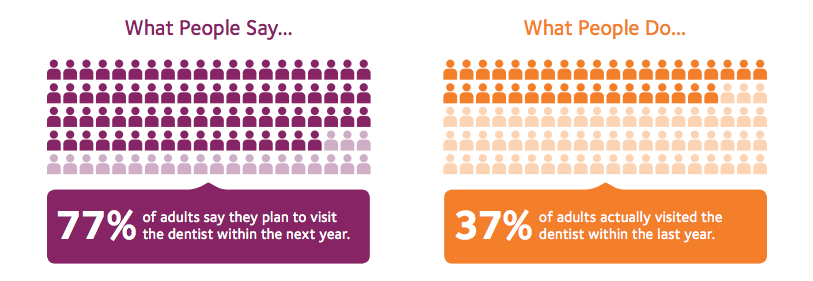 We’re constantly discovering remarkable new things about the human body. And staying on top of official findings helps you make sure you’re treating yourself the right way. Keeping a healthy smile for life and completely avoiding tooth loss is becoming a more universal reality. By following your dentist’s tips and seeing them twice yearly, you have a great chance at a lifelong grin – and avoiding frustrations like dentures, invasive dental work, and expensive restorations.
We’re constantly discovering remarkable new things about the human body. And staying on top of official findings helps you make sure you’re treating yourself the right way. Keeping a healthy smile for life and completely avoiding tooth loss is becoming a more universal reality. By following your dentist’s tips and seeing them twice yearly, you have a great chance at a lifelong grin – and avoiding frustrations like dentures, invasive dental work, and expensive restorations.
The American Dental Association’s Health Policy Institute recently released their conclusions stemming from a broad survey of 15,000 Americans, nationwide. This research division offers us up-to-date clues as to the ways we’re treating our teeth, and common oral health problems. If you’re ever experiencing one of the issues listed below, get in touch for help getting your mouth back to normal.
Americans’ Most Pressing Dental Problems
Two of these items are ones that you probably didn’t expect. This makes it all the more important that you get into the office regularly. We don’t always know what to look for when considering potential warning signs. If something in your mouth seems wrong or different, it’s never a bad idea to schedule an exam.
But while most Americans plan to visit the dentist, few actually follow through. The ADA’s report yielded the following finding:

Don’t let yourself fall into that second group. Be wary of the problems detailed below.
Dry Mouth
33% of the survey’s participants experienced dry mouth occasionally or often. Also called xerostomia, dry mouth occurs when there’s not adequate saliva in the mouth. Your saliva plays a wide range of important roles, from protecting your enamel from acids to cleansing away bacteria. When your mouth is dry, it’s at risk.
Insufficient saliva production leads to oral dryness – but what’s the underlying issue with your salivary glands? The reason is different from person to person. But one of the most common sources is a new medication. Countless medications list dry mouth as a side effect, which is why it’s imperative that you tell your dentist when you start a new drug.
Dry mouth can also stem from
- Age – Technically, aging doesn’t cause dry mouth. But many medications that are common for older individuals do, as do other senior health conditions.
- Cancer treatment – Chemotherapy drugs can change saliva and how much (or how little) is produced. Radiation can cause damage to the salivary glands.
- Head or neck injury – Nerve damage to those areas can result in reduced saliva.
- Tobacco use – Both smoking and chewing tobacco damage oral tissues and increase the risk of dry mouth.
- Other health conditions – Snoring, HIV/AIDS, stroke, and Alzheimer’s can all lead to dry mouth.
Difficulty Chewing or Biting
Problems chewing or biting affect 31% of Americans surveyed. Younger respondents and low income respondents reported this at significantly higher rates than the overall population. This points to some of the main causes of the reported poor dental function. Those who aren’t receiving regular exams and preventive dental care are likely to see increasingly serious problems. Some common causes of chewing and biting difficulty include:
- Advanced decay – If cavities progress, they will begin to affect tooth structure and undermine dental function. They also cause pain that makes it uncomfortable to chew properly.
- Tooth sensitivity – When you’re dealing with severe sensitivity, it’s hard to consume hot or cold foods. This sensitivity can stem from worn enamel due to frequent exposure to acidity, or grinding.
- Infected or damaged tooth – A tooth in need of a root canal is difficult to use due to pain and pressure.
- Poor nutrition – This is actually a self-fulfilling cycle, as poor nutrition can lead to dental problems, which then make it more difficult to eat fresh produce and other healthy foods. Some individuals end up choosing processed foods since they’re much easier to chew.
- Ill-fitting dentures – Awkward dentures don’t work the way restorations should, and making chewing especially tricky. Make sure you see your dentist if your dentures aren’t fitting properly.
- Malocclusion – A bad bite can lead to patients frequently biting their tongue or cheek. The jaws don’t fit together properly, and don’t work as they should. Bite issues can sometimes be resolved with dental treatment, but it is possible that orthodontics will be necessary.
Oral Pain
Mouth pain is another widespread concern, affecting 29% of those surveyed. It was also reported by over 40% of people who were from lower-income households or aged 18-34. Tooth pain and gum pain have countless potential causes – seeing a dentist is necessary to discover yours. Pain can point to injury, disease, decay, or links to other health conditions. Seek out treatment today to get an early diagnosis.
Dalton General Dentist | Dalton Dentist | General Dentistry Dalton

 We’re constantly discovering remarkable new things about the human body. And staying on top of official findings helps you make sure you’re treating yourself the right way. Keeping a healthy smile for life and completely
We’re constantly discovering remarkable new things about the human body. And staying on top of official findings helps you make sure you’re treating yourself the right way. Keeping a healthy smile for life and completely 



